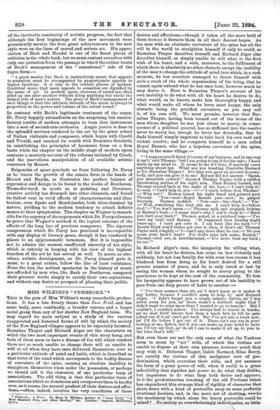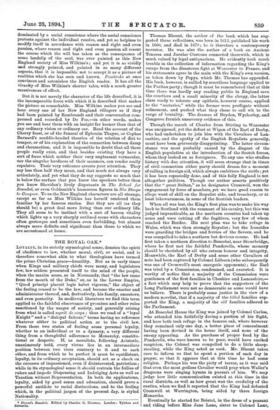MISS WILKINS'S "PEMBROKE." *
THIS is the gem of Miss Wilkim3's many remarkable produc- tions. It has a less dreary theme than Jane Field, and has more body, more continuity, a broader canvas, and a larger social grasp than any of her shorter New England tales. We may regard its main subject as a study of the various exaggerated and distorted forms of will by which the society of the New England villages appears to be especially haunted. Barnabas Thayer and Richard Alger are the characters on which the two most important events of this story hang, and both of them seem to have a disease of the will which renders them not so much unable to change their will as unable to will at all when they have once delivered themselves over to a particular attitude of mind and habit, which is described as that twist of the mind which corresponds to the bodily disease of curvature of the spine, causing an absolute inability to straighten themselves when under the possession, or perhaps we should call it the obsession, of one particular train of associations. The odd thing is that this particular train of associations which so dominates and overpowers them is hardly ever, as it seems, the natural produat of their desires and affec- tions,—often, indeed, involves the very crucifixion of these
•
Pembroke: a Novel. By Mary E. VAIldhs, Author of "Jane Field," "A Nov England Nun, and other Stories," ao. London: Osgood, Mellvaine, ad 003. desires and affections,—though it takes all the more hold of them because it thwarts them in all their dearest hopes. As the man with an obstinate curvature of the spine has all the will in the world to straighten himself if only he could, so Barnabas Thayer describes himself, and Richard Alger also describes himself, as simply unable to will what is the first wish of his heart, and a wish, moreover, to the fulfilment of which there is absolutely no other obstacle except the inability of the man to change the attitude of mind into which, in a rash moment, he has somehow managed to throw himself with such a crash of the whole organisation of his being, that he cannot again unbend what he has once bent, however much he may desire it. Here is Barnabas Thayer's account of his own inability to do what with all his heart he desires to do, what would, as he knows, make him thoroughly happy, and what would make all whom he loves most happy, the only obstacle being the petrified curvature, as you may call it, of his own will. We must premise however that Bar- nabas Thayer, having been turned out of the house of the man whose daughter he was just about to marry, in conse- quence of a political quarrel, has so stiffened into the resolve never to marry her, though he loves her devotedly, that he finds himself simply impotent to take back his own rash and violent resolve; and he compares himself to a man called Royal Bennet, who has a hopeless curvature of the spine, living in the same village :— "' I suppose you'll think it's none of my business, and in one way it isn't,' said Thomas, but I am going to say it for her sake ; I have made up my mind to. It seems to me it's time, if anybody cares anything about her. What are you treating Charlotte Barnard so for, Barnabas Thayer? It's time you gave an account to some- body, and you can give it to me.' Barney did not answer. Speak, you miserable coward !' shouted Thomas Payne, with a sudden threatening motion of his right arm. Then Barney turned, and Thomas started back at the sight of his face.—' I can't help it.' he said.—' Can't help it, you—'—' I can't, before God, Thomas.'
— "Why not ?' Barney raised his right hand and pointed past Thomas. You—met—Royal Bennet just—now,' he gasped hoarsely. Thomas nodded. You—saw—his—back: — 'Yes.
- Well, something like that ails me. I can't help it—before God.'—' You don't mean—' Thomas said, and stopped, looking at Barney's back.—' I mean that's why I can't—help it.'—'Have you hurt your back ? ' Thomas asked, in a subdued tone.—' I've hurt my soul,' said Barney. 'It happened that Sunday night years ago. I can't get over it. I am bent like his back.'—' I should think you'd better get over it, then, if that's all,' Thomas Payne said, roughly.—' I—can't any more than he can.'—' Do you mean your back's hurt? For God's sake talk sense, Barney !' Thomas cried out, in bewilderment.—' It's more than my back ; its me."
In Richard Alger's case, the incapacity for willing what, with all his heart he desires, has come on less violently and suddenly, but not less fatally, for with even less excuse it has hindered him from doing as his heart desired for a still greater number of years, and he is only cured at lad by seeing the woman whom he sought to marry going to the poorhouse to be kept at the cost of the community. To him his incapacity appears to have grown out of his inability to pass from one deep groove of habit to another :—
" I've been meaner than sin, an' I don't know as it makes it any better, because I couldn't seem to help it,' said Richard Alger. 'I didn't forget you a single minute, Sylvia, an' I was awful sorry for you, an' there wasn't a Sabbath night that I didn't want to come more than I wanted to go to heaven ! But I couldn't, I couldn't nohow. I've always had to travel in tracks, an' no man livin' knows how deep a track he's in till he gets jolted out of it an' can't get back. But I've got into a track now, an' I'll die before I get out of it. There ain't any use in your looking at me, Sylvia, but if you can make up your mind to have me, I'll try my best, an' do all I can to make it all up to you in the time that's left.'" But even these are not the only cases of what the Yankees seem to mean by "set" wills, of which the victims are unable to dispose at their own pleasure, however much they may wish it. Deborah Thayer, Caleb Barnard, Silas Berry, are equally the victims of this malignant sort of pre- destination, which overrules their wills, and yet assumes the form of a great power of will, when it really is a great inflexibility that signifies not power to do what they dislike, but impotence to da what they both desire and approve.
Is it the predestinarian teaching of the old Puritans which has engendered this strange kind of rigidity of character that
shuts down with a kind of portcullis snap on some perfectly irrational decision, and, in the mere act of shutting, wrecks the machinery by which alone the heavy portcullis could be raised? No society so overwhelmingly individualist, salads-
dominated by a social conscience where the social conscience protests against the individual resolve, and yet so helpless to modify itself in accordance with reason and right and even passion, where reason and right and even passion all resent the course which the will has taken as the consequence of some landslip of the soul, was ever painted as this New England society of Miss Wilkins's ; and yet it is so vividly and strongly painted, and painted in so many different aspects, that it is impossible not to accept it as a picture of realities which she has seen and known. Pembroke at once convinces and astonishes the English reader. It has all the vivacity of Miss Wilkins's shorter tales, with a much greater massiveness of effect.
But it is not merely the character of the life described, it is the incomparable force with which it is described that makes the picture so remarkable. Miss Wilkins makes you see and hear every one of her New England villagers as if they had been painted by Rembrandt and their conversation com- pressed and recorded by De Foe,—in other words, makes you see and hear them with an insight far keener than that of any ordinary vision or ordinary ear. Read the account of the Cherry feast, or of the funeral of Ephraim Thayer, or Cephas Barnard's muddle-headed theories of the relation of diet to temper, or of his explanation of the connection between damp and rheumatism, and it is impossible to doubt that all these people really exist, and that besides existing they have a sort of force which neither their very unpleasant vernacular, nor the singular hardness of their manners, can render really repulsive. Their very reticence arrests your attention. They say less than half they mean, and that much not always very articulately, and yet what they do say suggests so much that is below the surface that you know the speakers better than you know Sheridan's lively disputants in The School for Scandal, or even Goldsmith's humorous figures in She Stoops to Conquer. To us the New England characters are all strange, except so far as Miss Wilkins has herself rendered them familiar by her famous stories. But they are all (as they should be) a great deal more living than our ordinary life. They all seem to be instinct with a sort of barren vitality which lights up a very sharply outlined scene with characters often grotesque and sometimes even forbidding, but almost always more definite and significant than those to which we are accustomed at home.



































 Previous page
Previous page